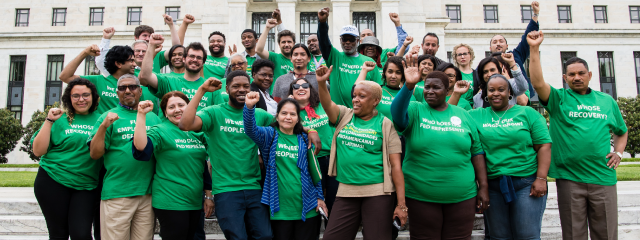CPD and EPI Release New Report on Forced Arbitration and Workers’ Rights

On May 21, 2019, CPD released a new report in partnership with the Economic Policy Institute (EPI), "Unchecked Corporate Power: Forced arbitration, the enforcement crisis, and how workers are fighting back.” The report highlights the important work that Make the Road NY, Working Washington, PCUN, Maine People's Alliance, Rights & Democracy, and other groups are leading to win new workplace protections and fight forced arbitration. Forced arbitration—or clauses in employment contracts that require workers to waive their right to sue their employer or participate in class-action litigation—is a serious threat to our gains on minimum wage, earned sick leave, fair workweek laws, and other core guarantees including anti-discrimination measures.
The report release date marked the one-year anniversary of the Supreme Court’s ruling on Epic Systems Corp. v. Lewis, which upheld the legality of forced arbitration. In the report, CPD and EPI assess that decision’s disastrous impact on working families and predict that by 2024, more than 80 percent of private-sector, nonunion workers will be blocked from court by forced arbitration clauses with class-action waivers. Without legal recourse, virtually all workers will have to rely on underfunded public worker-protection agencies to enforce their workplace rights. Our report includes new data showing that the resources and staffing of labor departments have shrunk at the federal level and in six states, even as the workforce has grown.
Although workers from tech companies including Google, Uber and Lyft have succeeded in pressing their employers to roll back some of their forced arbitration policies, the resulting company-by-company changes are extremely limited. To effectively and permanently restore the rights of millions of workers affected by forced arbitration, our report recommends two pieces of federal legislation, the Restoring Justice for Workers Act—which would overturn the Epic Systems ruling—and the Forced Arbitration Injustice Repeal (FAIR) Act, which would make forced arbitration clauses unenforceable. The report further details a whistleblower enforcement model that would authorize workers at the state level to initiate actions for violations of labor law and help public enforcement agencies partner with workers and community organizations.
Read or download the full report and read extended coverage of the report in CityLab, featuring Brenda Rojas, a PCUN member and first-generation college student in Salem, Oregon.












